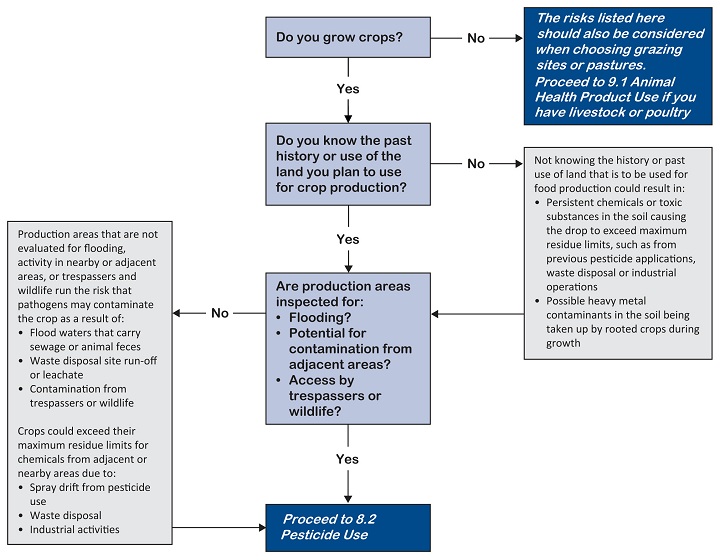Crops - 8.1 Soil and environment evaluation
Food grown on any field may be contaminated by flooding, past land uses, the surrounding environment or trespassers.
This good agricultural practice applies to all farms growing crops.
What needs to be done
Do not carry out production in fields or orchards where conditions may lead to a hazard unless the site is managed to minimize the risk.
How to do it
Flooding contamination
Evaluate production areas for potential flooding. Flood waters can carry sewage, animal waste and other contaminates onto the production site. This is a particular concern for fresh fruit and vegetables that are grown close to the ground and can be eaten raw. If flooding has occurred, speak with provincial and/or federal agricultural specialists to discuss safe food options or concerns. Also see Risk assessment for agricultural flooding events.
Land use contamination
If land is rented, investigate former land use as much as possible to ensure that the land was not formerly used for waste disposal or for other industrial purposes that may have left behind toxic residues. When there is a concern, soils should be tested for contaminants and land use adjusted to comply with test results.
If the land was previously used for agricultural purposes, review previous crop history and pesticide use records, if available, to determine if persistent chemicals (e.g. organochlorines) have been used on site. If they have, the risk of contamination is higher for root crops. These types of produce may need to undergo chemical residue testing if grown on this site.
Generally speaking, the risk of heavy metal (for example lead, cadmium) contamination in plants is low. However, the potential for heavy metal uptake varies depending on the commodity, with the risk being higher for root crops and leafy greens. If there are concerns about heavy metal residues due to previous land use or the surrounding environment, test the soil before planting these higher-risk crops. Increasing the pH of the soil can reduce the risk of plant uptake, as heavy metals are less mobile and there is less uptake in neutral soils than in acidic soils. For more detailed information see the Standard for metals in fertilizers and supplements (Table II). (Canadian Food Inspection Agency)
Contamination due to surrounding environment
Inspect and identify the potential for biological or chemical contamination from adjacent lands. Be aware of the potential risk from run-off, flooding or wind drift if the production area is near livestock operations or areas where manure or pesticides are applied. If there is suspected contamination, conduct a groundwater or soil analysis.
Assess the potential for contaminating produce from leaking, leaching or overflowing manure storage sites.
Contamination due to trespassers
Restrict animal access to fresh fruit and vegetable production areas as much as possible, particularly near or at harvest times, as fecal contamination carries the same risk as fresh manure application.
Establish visual, physical or auditory deterrents (for example, fencing or noise makers) to redirect wildlife and minimize the risk of them entering fields.
Routinely check for outside sources of contamination from human trespassers, including trash and broken bottles that could contaminate fresh produce.
In general
Communicate regularly with neighbours and understand the types of activities in the immediate area. If there are any concerns, adjust planting dates or field locations to minimize the potential for contamination.
Re-evaluate potential risks when activities either on the site or adjacent to the production area change.
If you have an audit
Be prepared for the auditor to:
- Observe areas of production for potential flooding and risks posed by surrounding environment and trespassers
- Ask questions about previous land use
Laws and regulations
There are few laws that directly or indirectly relate to food safety specifically regulating the soil and environment for agricultural production. The prohibitions in law are generally against selling food with unacceptable residues or contaminants, rather than prohibiting certain levels in the soils themselves. Due diligence should influence management decisions where there is any reason to be concerned that contaminants may exist in the soil.
Although there is no specific provincial regulation for nutrient management, farmers are encouraged to conduct Nutrient Management Plans via the B.C. Environmental Farm Plan (EFP) Program. The Agricultural Waste Control Regulation, Reg. 131/92, Code of Agricultural Practice for Waste Management, regulates use of manure and other agricultural wastes as fertilizer or soil conditioner.
| Go back to 7.4 Loading and unloading | Proceed to 8.2 Pesticide use |

